How is it that human beings can be both amazingly kind and altruistic, and can also inflict brutal violence? Are we actually composed of two different species? What drives us in such different directions?
THE WISE AND THE WICKED

The Bible is quite clear that there are two ways to live your life, the way of wisdom and the way of wickedness. Indeed there are not just two ways, there are two different types of people, the righteous and the wicked, the wise and the fools.
The Psalms and Proverbs in the Bible, make this plain:
‘The Lord watches over the way of the righteous
But he way of the wicked will perish.’ (Psalm 1.6)
‘The righteousness of the blameless keeps their ways straight,
but the wicked fall by their own wickedness.’ (Proverbs 11.5)
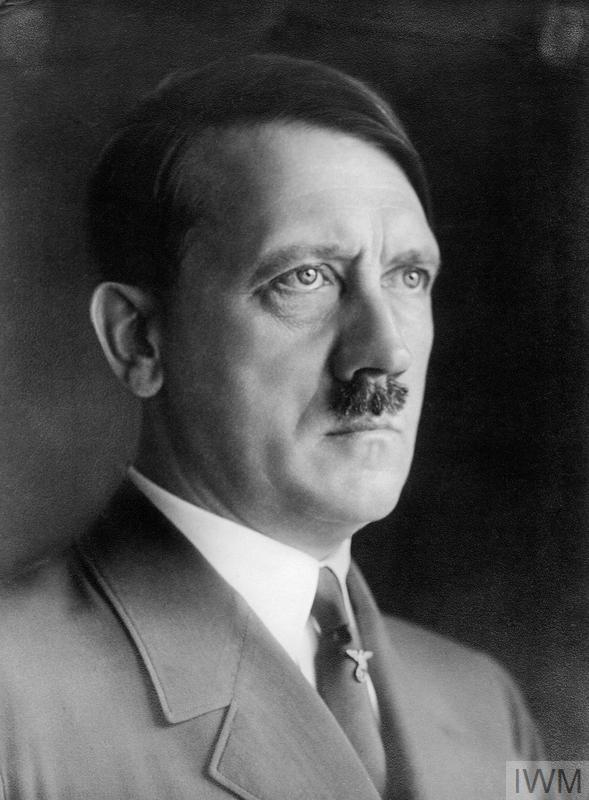
NOT SO SIMPLE
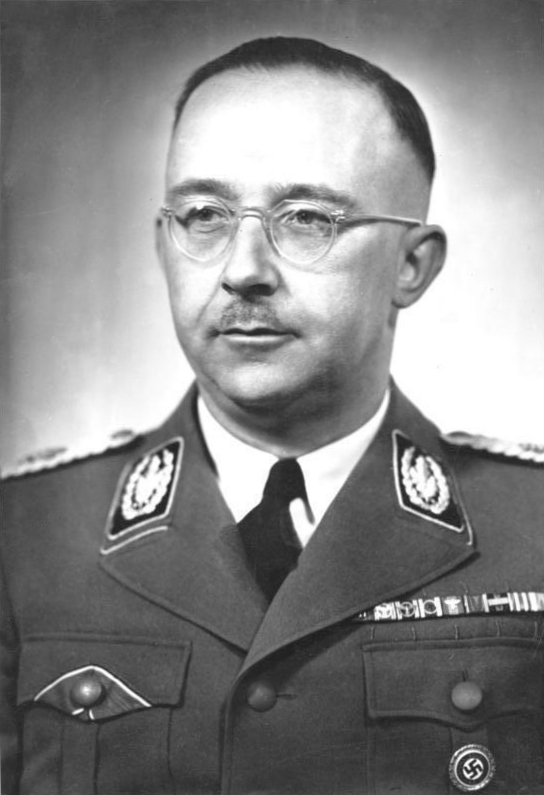
But is life so simple? I remember how shocked I was at the beginning of the film ‘Untergang’/‘Downfall’, about the last day of Hitler. It started in 1943 with Hitler interviewing some girls for the job of his secretarial assistant. He was genuinely charming and kind.
Himmler was the head of the Nazi SS, ran the German concentration camps and was chief architect of the ‘Final Solution’ which killed six million Jews as well as three million Poles, half a million gypsies, homosexuals and others. Yet he wrote affectionate letters home to his wife and daughter, (as well as to his mistress and her children), in one of which he wrote, “We have to be bad so our children can be good.” How strange to hold such contrary opinions in one’s own head.
In the fourth volume of G K Chesterton’s Father Brown stories, the priest tells how he was able to solve all those mysterious murders:
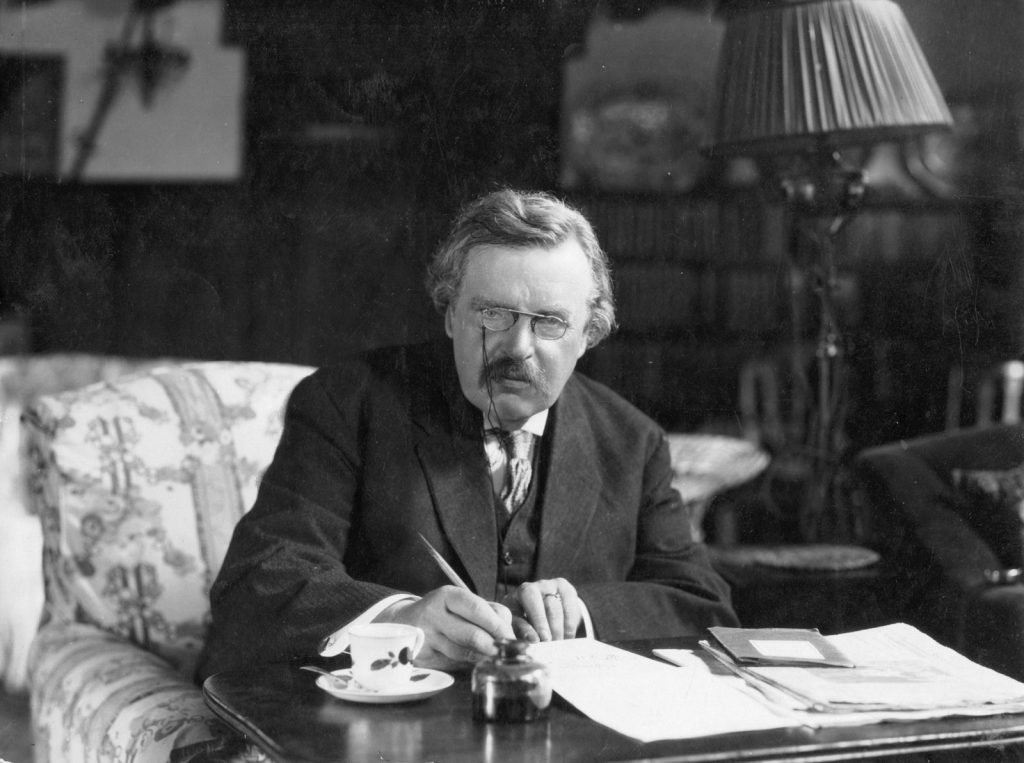
“ You see, I had murdered them all myself … I had planned out each of the crimes very carefully. I hd thought out exactly how a thing like that could be done, and in what style or state of mind a man could really do it. And when I was quite sure that I felt exactly like the murderer myself, of course I knew who it was.”
St Paul recounts his personal experience. “ I do not do the good I want, but the evil I do not want is what I do. Now if I do what I do not want, it is no longer I that do it, but sin that dwells within me.” (Romans 7.19-20)
Where does this double-mindedness come from?
WHO’S TO BLAME?
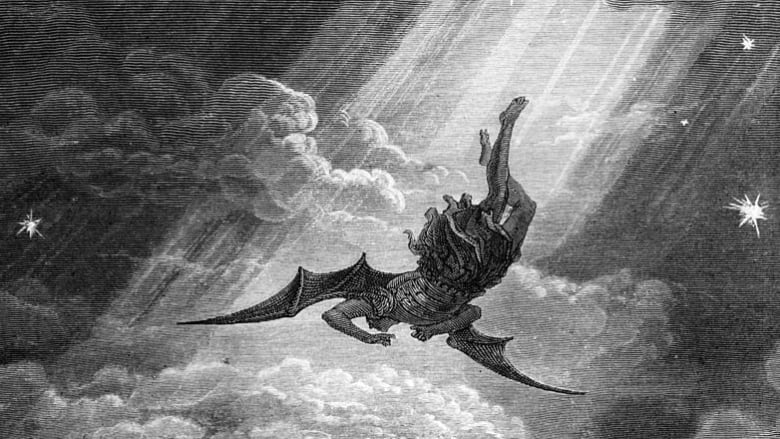
The New Testament teaches that we have a spiritual enemy, a satanic force, which messes things up:
“I watched Satan fall from heaven like a flash of lightning.” (Luke 10.18)
“You were dead through the trespasses and sins in which you once lived, following the course of this world, following the ruler of the power of the air, the spirit that is now at work among those who are disobedient.” (Ephesians 2.1) ‘After (Judas) received the piece of bread, Satan entered into him. He immediately went out. And it was night.’ (John 13.27, 30)
The great merit of this way of thinking is that it takes the fact of evil seriously. There may indeed be various spiritual influences on people and places for good and ill, but it does not explain how it works within our minds. For that we have to turn, if not to Adam and Eve, certainly to the past.
OUR BEASTLY INHERITANCE

Charles Darwin’s ‘The Origin of the Species’ was a great shock to our great-great-grandparents’ view of themselves. Suddenly we were no longer ‘the crown of all creation’ (to quote the Church of England’s 2000 liturgy), but part of the animal kingdom. In fact, in 1990 Pope John Paul II reversed a century of Catholic teaching when he said, “the animals possess a soul and men must love and feel solidarity with our smaller brethren…. They are the fruit of the creative action of the Holy Spirit and merit respect … and they are as near to God as (humans) are.”
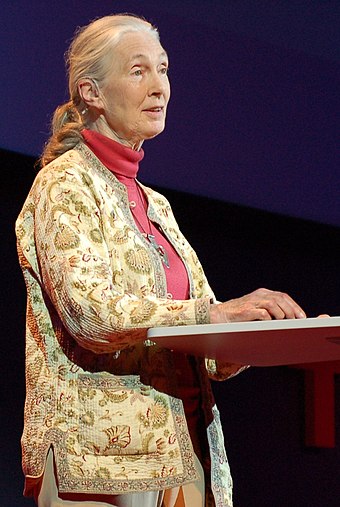
If, because of loss of faith, we could not comfort ourselves with the notion that, unlike animals, we had immortal souls, we could at least differentiate ourselves from the beasts by asserting that we are the only species intelligent enough to use tools. But in 1960 Jane Goodall started her observation of chimpanzees at Gombe, Tanzania. She witnessed acts of compassion, caring and peace-making. She also reported one chimpanzee using grass stems to get termites out of a termite mound. A scientific uproar ensued. ‘Man the Toolmaker’ was no longer unique.
Sadly, nor was ‘Man the Violent’. From 1974 to 1977 Jane witnessed a gruesome war between the main chimpanzee community and a smaller one that had moved away. Unprovoked and vicious attacks by males and females including cannibalism took place until the smaller community had been exterminated.

‘So here we are, the human ape, half sinner, half saint, with two opposing tendencies inherited from our ancient past pulling us now towards violence, now toward compassion and love.’ (Goodall – Reason for Hope p. 143)
OUR BRAIN
Human acts of good and evil, of creation and destruction clearly originate in the mind. In other words, in the brain. So can the study of the brain provide any clues as to the origin of human good and evil? I think so.
In the 1960’s the American neuroscientist Paul D. MacLean publicised the triune brain theory. He proposed that there were three brains within our human brain. Although they are more interconnected than originally proposed, It is still a useful way to think about our thinking.

- The primal or reptilian brain, centred in the basal ganglia or brain stem, regulates all the automatic functions that are essential to life – breathing, heartbeat etc. This may have started developing 500 million years ago. It also creates the impulse for the four ‘Fs’ – feeding, fighting, fleeing and f… reproduction.
In her book The Secret Dowry of Eve, Women’s Role in the Development of Consciousness, Glynda-Lee Hoffmann contends that in many humans the reptilian cortex (agenda: territory and reproduction; or in humans power and sex) is out of control. A classic example is when someone experiences the ‘red mist’ and they are overwhelmed by rage.
- the ancient mammalian brain or the limbic system, including the amygdala and hippocampus, is in the centre of the brain and deals with emotions, behaviour and long-term memory.
G L Hoffmann says that it is the amygdala that stokes the fear that leads to more bad behaviour.
Prof Steve Peters calls the limbic system ‘the chimp brain’ (‘The Chimp Paradox’). Key to understanding human behaviour is that our anxious chimp brain works five times faster than our human brain, i.e. in any argument it will always win.
The habitual ‘chimp’ state is one of anxiety. As hunter-gatherers we were in the middle of the food chain. It is second nature for us constantly to scan our environment for potential dangers.
- the neo-cortex is six layers of neurones, found only in mammals. Human beings have a much larger percentage of the brain as neo-cortex, twice the proportion of that of chimpanzees. This gives greater voluntary inhibitory control of social behaviours resulting in increased social harmony. It also is the instrument for conceptual thought.
The human brain is our thinking brain, who we are as persons. It is the similar in both men and women, though it seems that female brains are by and large more skilled at language, male brains at maths and spatial awareness.
G L Hoffmann distinguishes the prefrontal cortex as uniquely different from the rest of the neocortex. The prefrontal cortex, with its agenda of integration, is the part of the brain that can get the other parts to work together for the good of the individual.
However, our neo-cortex – the most human part of ourselves, is not always the prime determinant of our behaviour.
OUR INSTINCTUAL DRIVES
Homo sapiens has been around for about 300,000 years. 95% of that time we were hunter-gatherers. Hard-wired into our ‘chimp’ brains are the ways we coped with a dangerous environment for thousands of years. Our survival as a species depended on three instincts: follow the leader; my home is my castle; and there is nothing like a dame. Unfortunately these instincts are also the seedbed of gross human evils like genocide, blind obedience and rape.
Follow the Leader
Imagine you are part of a group of hunters hoping to kill a mammoth. It’s a dangerous situation and the group needs to act in concert. So there is a leader, probably the strongest in the group. Survival depends on doing what he says. There is little room for independent thought.
Even St Paul signed up to this:

‘Let every person be subject to the governing authorities; for there is no authority except from God, and those authorities that exist have been instituted by God. Therefore whoever resists authority resists what God has appointed,’ (Romans 131,2)
Scroll forwards several thousand years. In Germany Hitler proclaims that “He who would save a people can only think heroically”. People submerge their doubts and enthusiastically follow his lead – or else they keep silent. Putin’s popular approval rate in Russia is over 75% (as at April 2023). It is the patriotic, the honourable thing to do, to ‘follow the leader’. So ordinary people get seduced into becoming killers and torturers by regimes like Hitler’s, Pinochet’s in Chile, the Russian FSB today, or simply join in the Capitol Hill riot.
The alternative is to use our human brain, our neo-cortex, to think for ourselves – but that could be dangerous.
My home is my castle
Each kinship group of our hunter ancestors would have had their territory, as the great apes do today. Survival depended on defending it against the depredations of neighbours, particularly if they were of a slightly different species. If the numbers of our group became too many for our existing territory, or if we thought that that might happen, then survival depended on taking over the territory of our neighbours. Genocide was the natural result, whether the extermination of our Neanderthal cousins or the wiping out of the Canaanites. The policy of the Assyrian empire of merely relocating a population to a different part of the empire was a dramatic improvement in human behaviour.
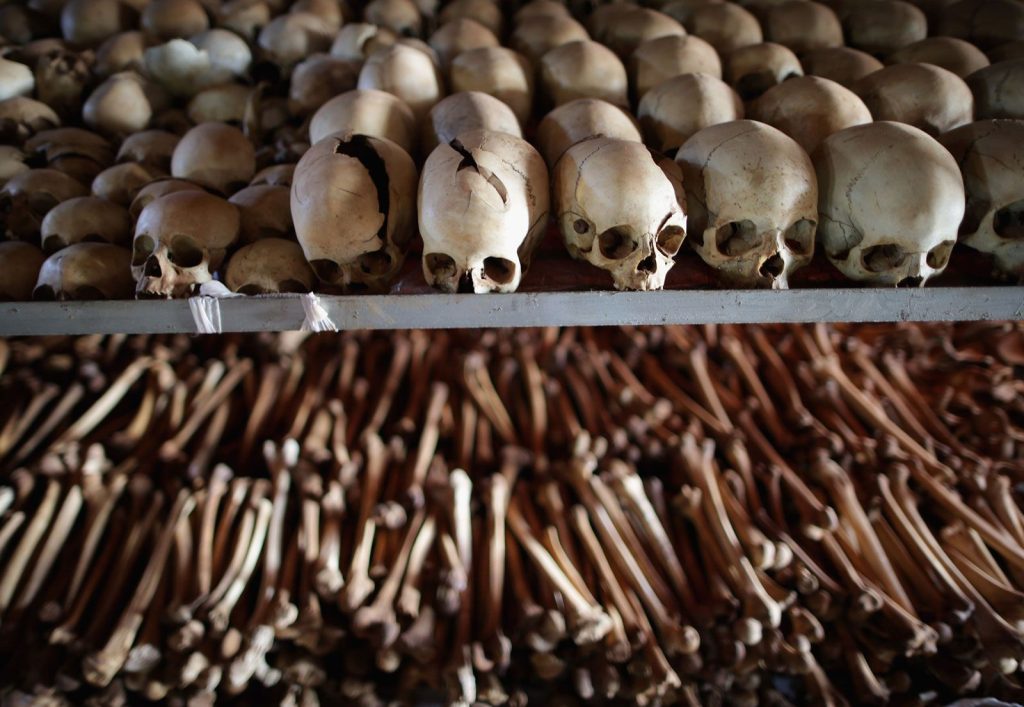
An example of how easy it is to make humans commit genocide was seen in Rwanda. Between January 1993 and March 1994 half a million machetes were imported into the country. In August 1993 a new radio station came on the air, Radio-Television Libre des Milles Collines (RTLM). It started by playing Congolese dance music almost non-stop and became very popular. At the start of 1994 it started saying that the country faced an internal threat. Tutsis were regularly referred to as cockroaches. Children also became a target: “A cockroach cannot give birth to a butterfly.” Fear and hatred were constantly ramped up. On 6th April 1994 the President was killed by a rocket attack on his airplane. Instantly the genocide plans were put into effect. “Do your work.… Cut the tall trees (i.e. Tutsis).” Between 7th April and 15th July between 500,000 and 660,000 Tutsis were killed, many by their neighbours and fellow-villagers. (Taken for ‘An Ordinary Man’ by Paul Rusesabagina)
It is our territorial instinct that fuels fear of refugees and indeed the whole Brexit campaign – which did lead to a political murder.
There is nothing like a dame
Human beings are unusual. We are part of that 5% of mammalian species which aim at being monogamous. Our nearest monogamous relatives are marmosets and tamarins; certainly not chimpanzees. And we are almost the only one to have no mating season. So presumably in our hunter-gatherer days, any male finding a female alone would attempt to impregnate her, as his contribution to the survival of the species.

However, because human children take so long to reach maturity, it was also essential to have a parental drive, giving long-term protection and care to the female and her offspring. Anything that broke that bond would provoke a violent reaction:
He who commits adultery has no sense;
he who does it destroys himself.
For jealousy arouses a husband’s fury,
and he shows no restraint when he takes revenge.
He will accept no compensation,
and refuses a bribe no matter how great. (Proverbs 6.32, 34-35)
A healthy society is one in which the majority of people have grown up and live more from their human brain and less from their chimp brain. Alcohol tends to put our human brain to sleep and energises our chimp brain. In a 1970’s episode of ‘The Liver Birds’, a flatmate apologised for entering the living room and interrupting a clinch which her friend was engaged in. She replied, “Oh no, no problem. It was me against myself and I was losing.”
This is a good example of how the two parts of our brain, the neo-cortex and the limbic system work differently. Perhaps we are at our best if we can get the different parts of ourselves to work together in harmony.
WHAT’S THE POINT?
Why should we bother about living as good people rather than wicked people? First, because the latter live from fear and anger, which are unpleasant, the former live out of a sense of companionship and creativity. The second reason is that there is a new dimension of life, a spiritual one transcending our everyday selves, of which we are dimly aware. And this spiritual life may well transcend death.

In his remarkable book ‘The Devils of Loudun’ (1952), Aldous Huxley reflected on the discreditable story of the worldly parish priest, Urban Grandier, and his destruction by means of the apparent demonic possession of the nuns of the town. Yet throughout he gave the most life-affirming reflections. In chapter three he discussed the human urge of self-transcendence, to go beyond our “sweating selves”.
‘Self-transcendence is by no means invariably upwards. Indeed, in most cases, it is an escape either downwards into a state below that of personality, or else horizontally into something wider than the ego, but not higher, not essentially other.
‘We are for ever trying to mitigate the effects of the collective Fall into insulated selfhood by another, strictly private, fall into animality and mental derangement, or by some more or less creditable self-dispersion into art or science, into politics, a hobby or a job. Needless to say, these substitutes for upward self-transcendence, these escapes into the subhuman or merely human surrogates for Grace, are unsatisfactory at the best and, at the worst, disastrous.
‘The only liberating self-transcendence is through selflessness and docility to inspiration (in other words union with the Son and the Holy Spirit) into the consciousness of that union with the Father in which, without knowing it, we have always lived.’ (Chapter III.iii)
CHALLENGE TO THE CHURCH
Similarities
If the Church is to stand a chance of being heard in the public square, we have to acknowledge our joint inheritance of personhood with the rest of humanity. We all have the same brain and the same past. We have similar fears of sickness, pain and violence. We have the same capacity for joy and love. What all the major religions do offer is a basic preference for compassion and caring. Prayer and worship is a great training ground for this, because they take us, or should take us, out of ourselves.
Humility
Because we are made of the same warp and weft as the rest of humankind, it behoves us to be a bit humble. What made the sexual abuse scandal so damaging to the church was the assumption that ordained priests were somehow a superior mode of humans. Someone once asked one of the Desert Fathers (monks in Egypt) what they did as monks. He replied, “We fall and get up, fall and get up, fall and get up.”
There is more The 20th century critic and playwright George Bernard Shaw was walking at night with a woman friend who was in bits because her husband had left her. He pointed at the stars overhead and said, “My dear, there is more than this.”
All religions believe that there is more than this, more than our material universe. This should translate into openness towards the stranger, valuing giving over getting, and an optimistic view of death.

